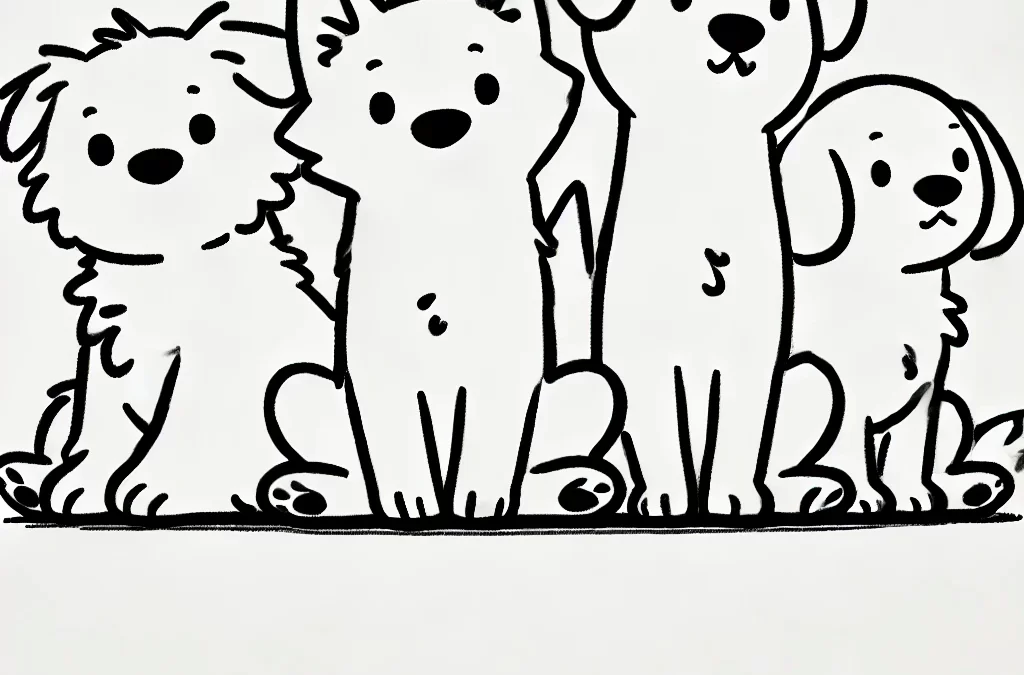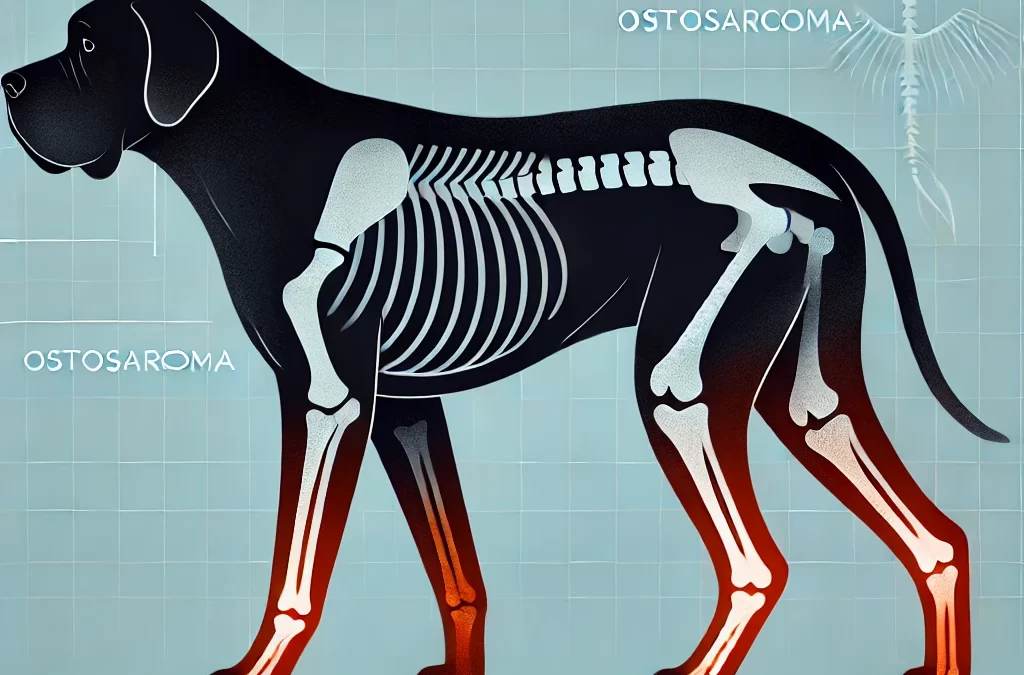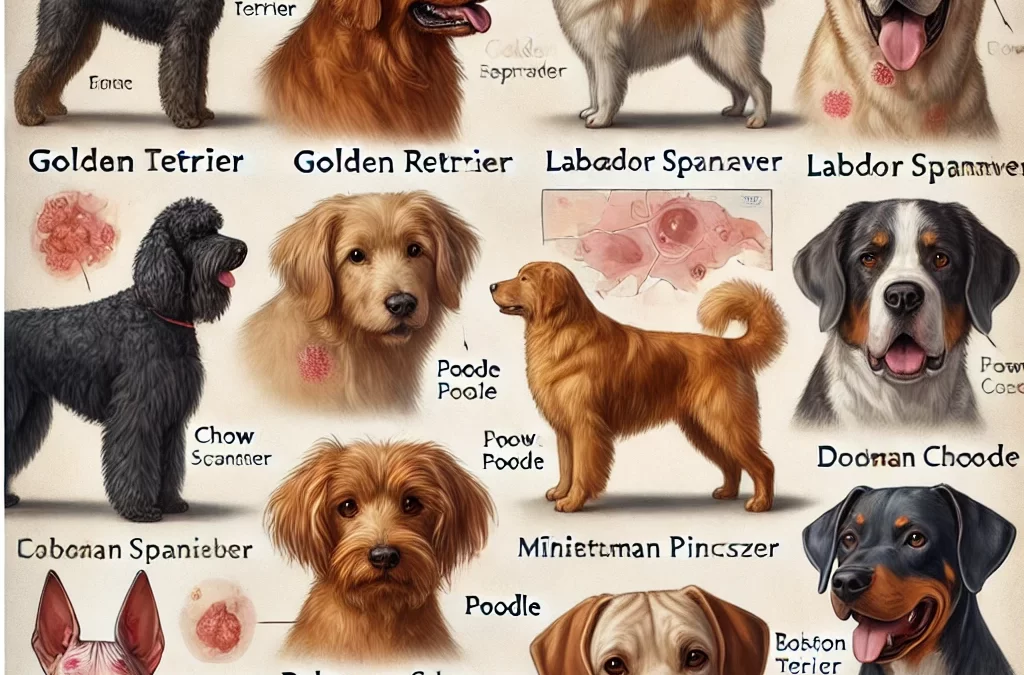
by TCMVET | Feb 6, 2025 | Dog Cancer & Tumors
Cancer is a growing concern for pet owners, especially those with multiple dogs. When a dog in the household is diagnosed with cancer, a common question arises: Is canine cancer contagious? Understanding the nature of cancer and how it spreads can help pet owners take appropriate precautions while providing the best care for their furry companions.
Is Cancer Contagious in Dogs?
The simple answer is no—most forms of cancer in dogs are not contagious. Unlike infectious diseases caused by viruses or bacteria, cancer is the uncontrolled growth of abnormal cells within an individual’s body. It does not spread from one dog to another through direct contact, shared food bowls, or proximity.
However, there are rare exceptions, such as transmissible venereal tumors (TVT), which can spread through direct contact, particularly during mating. TVT is one of the only naturally occurring transmissible cancers in dogs, and it mainly affects stray or unneutered dogs. Apart from this, conventional cancers such as lymphoma, osteosarcoma, and mast cell tumors cannot be transmitted between dogs.
Can Cancer Be Influenced by Environmental Factors?
While cancer itself is not contagious, dogs living in the same household may share common environmental risks that could contribute to cancer development. These include:
- Exposure to secondhand smoke – Dogs in smoking households have a higher risk of developing lung cancer and nasal tumors.
- Toxic chemicals – Pesticides, herbicides, and household cleaning products may increase the risk of cancer in pets.
- Diet and obesity – Poor diet and obesity-related inflammation can contribute to the development of cancer over time.
- Genetics – If multiple dogs in a household are from the same bloodline or breed, they may have a genetic predisposition to certain cancers.
What Should Multi-Dog Owners Do?
Even though cancer is not contagious, pet owners should take certain precautions to ensure the health and well-being of all their dogs:
1. Maintain a Healthy Environment
- Keep your home free of harmful toxins, including cigarette smoke and harsh chemicals.
- Avoid using pesticides and herbicides in areas where your dogs play.
2. Support a Nutritious Diet
- Feed all dogs a balanced, high-quality diet with fresh, natural ingredients.
- Consider supplements that support immune health, such as omega-3 fatty acids and antioxidants.
3. Monitor for Symptoms in Other Dogs
- Regularly check for lumps, swelling, weight loss, or behavioral changes.
- Schedule annual veterinary check-ups and routine cancer screenings, especially for senior dogs or breeds prone to cancer.
4. Provide Emotional Support
- If one dog is diagnosed with cancer, other dogs in the household may experience stress or behavioral changes.
- Maintain a stable routine and provide comfort to all pets in the home.
5. Consult a Veterinarian
- If you have concerns about cancer risks in your home, consult your vet for personalized advice on prevention and early detection.
Conclusion
Canine cancer is not contagious, but shared environmental factors and genetic predispositions may influence cancer risks in multiple dogs within a household. By maintaining a healthy home, providing proper nutrition, and staying vigilant for symptoms, pet owners can help their dogs live longer, healthier lives. If one of your dogs is diagnosed with cancer, offering love, comfort, and appropriate medical care is the best way to support them while ensuring the well-being of your entire pack.

by TCMVET | Jan 26, 2025 | Dog Cancer & Tumors
Osteosarcoma (OSA) is the most common primary bone cancer in dogs, and it disproportionately affects large and giant breeds. With its aggressive nature and rapid metastasis, this cancer presents a significant challenge for pet owners. However, understanding the risk factors and adopting preventive strategies can make a difference. This article explores why large dogs are more vulnerable to osteosarcoma and what proactive steps owners can take to minimize the risk.
Why Are Large and Giant Breeds More Susceptible to Osteosarcoma?
- Rapid Growth and Bone Development
Large and giant breed dogs grow quickly during their early months, putting stress on their bones. This rapid growth may lead to micro-damages in bone structures, creating a predisposition for cancerous mutations.
- Genetic Factors
Certain breeds have a genetic predisposition to osteosarcoma. Commonly affected breeds include:- Great Dane
- Saint Bernard
- Irish Wolfhound
- Rottweiler
- Greyhound
- Labrador Retriever
- Golden Retriever
- Limb Length and Bone Stress
Taller dogs with long limbs are more prone to bone stress. Osteosarcoma frequently occurs in weight-bearing bones like the radius, ulna, humerus, and femur.
- Hormonal Influence and Spaying/Neutering
Studies suggest that early spaying or neutering, particularly before skeletal maturity, may increase osteosarcoma risk. This is believed to be linked to the removal of sex hormones, which play a role in bone growth regulation.
- Chronic Inflammation and Bone Trauma
Repeated trauma, previous fractures, or orthopedic surgeries may increase cancer susceptibility in dogs, especially in breeds already predisposed to osteosarcoma.
How to Reduce the Risk of Osteosarcoma in Large Dogs
- Controlled Growth During Puppyhood
- Avoid high-calorie, rapid-growth diets that put excessive strain on developing bones.
- Feed large breed puppies specially formulated food that promotes steady, controlled growth.
- Balanced Diet with Antioxidants
- Incorporate foods rich in omega-3 fatty acids, turmeric, and antioxidants to combat inflammation and oxidative stress.
- A diet with controlled calcium and phosphorus levels supports bone health without overgrowth.
- Responsible Spaying and Neutering
- Consider delaying sterilization until the dog has reached skeletal maturity (typically around 18-24 months for large breeds).
- Discuss alternative sterilization options with a veterinarian to balance cancer risk with reproductive health.
- Regular Exercise Without Excessive Strain
- Low-impact activities like swimming and controlled walks help maintain bone and joint health.
- Avoid excessive jumping and repetitive high-impact activities, particularly in young dogs.
- Early Detection and Routine Checkups
- Regular veterinary screenings help detect subtle bone changes early.
- Owners should monitor for signs such as limping, swelling in limbs, persistent pain, or sudden difficulty in movement.
- Supplements for Bone Strength
- Glucosamine & Chondroitin: Supports joint and bone integrity.
- Vitamin D & K2: Helps with calcium absorption and bone density.
- Curcumin & Medicinal Mushrooms: Exhibits anti-inflammatory and potential anti-cancer properties.
- Avoidance of Environmental Toxins
- Reduce exposure to known carcinogens, including pesticides, tobacco smoke, and processed pet foods with artificial additives.
Final Thoughts
While large and giant breed dogs are at higher risk for osteosarcoma, preventative care can play a significant role in reducing this threat. A well-balanced diet, controlled exercise, responsible breeding, and regular health monitoring can help pet owners manage risks effectively. Being proactive not only improves a dog’s longevity but also enhances their overall quality of life. If you notice any signs of lameness or swelling, consult a veterinarian as early diagnosis is crucial for improving outcomes.

by TCMVET | Jan 26, 2025 | Dog Cancer & Tumors
Melanoma is one of the most concerning cancers in dogs, often appearing in the mouth, skin, nail beds, and even the eyes. While all dogs can develop melanoma, certain breeds are genetically predisposed due to their pigmentation, skin characteristics, and other biological factors. This article explores which dog breeds are more susceptible to melanoma, the role of environmental factors, and how pet owners can take preventive measures.
Why Are Some Breeds More Prone to Melanoma?
Melanoma arises from melanocytes, the pigment-producing cells in a dog’s body. The following factors contribute to an increased risk in certain breeds:
- Genetic predisposition – Some breeds inherit a higher likelihood of abnormal melanocyte growth.
- Pigmentation & coat color – Dogs with dark pigmentation, particularly black-coated breeds, are often more prone to oral melanoma. Conversely, lightly pigmented dogs are more susceptible to skin melanoma in sun-exposed areas.
- Environmental triggers – Prolonged sun exposure, immune system function, and even diet can influence the development of melanoma in dogs.
Breeds with Higher Risk of Melanoma
Research and veterinary case studies suggest that the following breeds have a higher risk of developing melanoma:
- Scottish Terrier – Often linked to skin melanoma, especially in sun-exposed areas.
- Golden Retriever – Prone to various cancers, including melanoma, particularly in their mouths.
- Labrador Retriever – Increased cases of oral melanoma have been reported.
- Cocker Spaniel – Higher occurrence of melanoma, particularly in the eyes (ocular melanoma).
- Chow Chow – Their dark pigmentation increases susceptibility to oral melanoma.
- Poodle – Miniature and standard Poodles have been diagnosed with nail bed melanoma.
- Dachshund – More likely to develop skin melanoma due to genetic factors.
- Doberman Pinscher – Higher incidence of oral and nail bed melanomas.
- Miniature Schnauzer – Prone to both skin and oral melanoma.
- Boston Terrier – Increased risk of skin melanoma, especially in lighter-colored individuals.
Environmental & Lifestyle Factors That Increase Risk
Even if a dog is not from a high-risk breed, external factors can still influence melanoma development:
- Sun exposure – Dogs with lighter skin or thin fur are at risk of UV-induced skin melanoma.
- Oral hygiene – Poor dental care can contribute to inflammation, potentially increasing oral melanoma risks.
- Age – Older dogs are more prone to cellular mutations that lead to melanoma.
- Toxins & diet – Chemical exposure and a lack of antioxidants in a dog’s diet may play a role in cancer susceptibility.
Preventive Measures for Dog Owners
- Routine vet check-ups – Early detection is crucial, especially for high-risk breeds.
- Oral and skin examinations – Regularly check inside your dog’s mouth, paws, and skin for unusual growths.
- Sunscreen protection – Light-skinned dogs should avoid excessive sun exposure, and pet-safe sunscreen can help.
- A balanced diet – Antioxidants and omega-3 fatty acids can support immune function and reduce inflammation.
- Maintain oral health – Brushing your dog’s teeth and providing dental chews may lower oral melanoma risks.
Final Thoughts
While melanoma is an aggressive cancer, awareness of breed-specific risks and proactive care can help in early detection and prevention. Regular check-ups, a healthy diet, and vigilant monitoring can make a significant difference in a dog’s health. If you notice any unusual lumps, especially in your dog’s mouth, seek veterinary advice as soon as possible.

by TCMVET | Jan 22, 2025 | Dog Cancer & Tumors
As pet owners seek alternatives to conventional cancer treatments like surgery, chemotherapy, and radiation, Traditional Chinese Medicine (TCM) has emerged as a promising complementary approach for dogs with tumors. TCM views cancer as an imbalance in the body’s vital energy (Qi) and aims to restore harmony through herbal medicine, acupuncture, and dietary therapy. But how effective is it? And how can we integrate these treatments into a holistic cancer care plan for dogs?
This article challenges conventional views on canine cancer treatment by diving deep into the ancient wisdom of TCM, merging it with modern veterinary insights to offer a fresh perspective on natural healing.
1. Understanding Cancer in Dogs from a TCM Perspective
In Western medicine, cancer is seen as uncontrolled cell growth often triggered by genetic, environmental, or dietary factors. TCM, however, interprets tumors differently:
- Stagnation of Qi and Blood: Tumors form when energy and blood become blocked, preventing proper circulation.
- Accumulation of Dampness and Phlegm: Excessive moisture in the body can condense into masses.
- Kidney and Spleen Deficiency: Weak organ function can lead to toxin buildup, reducing the body’s ability to clear abnormal cells.
TCM treatment focuses on removing blockages, strengthening organ function, and boosting immunity rather than simply destroying cancer cells.
2. Herbal Medicine: A Natural Approach to Tumor Reduction
Chinese herbal formulas for cancer aim to shrink tumors, enhance immune function, and support organ health. Some commonly used herbs include:
- Baituxiao (白兔肖): Known for its ability to inhibit tumor growth, clear heat, and detoxify the body.
- Huang Qi (黄芪, Astragalus): Strengthens immunity and improves energy flow, often used alongside conventional treatments.
- Ban Zhi Lian (半枝莲, Scutellaria Barbata): Has anti-cancer properties and supports liver health.
- Ling Zhi (灵芝, Reishi Mushroom): A powerful adaptogen that enhances immune response and reduces inflammation.
- Dang Gui (当归, Angelica Sinensis): Promotes blood circulation and prevents Qi stagnation, commonly used for tumors involving the skin or muscles.
These herbs are often prescribed in formulas tailored to a dog’s specific constitution and tumor type, making personalized treatment essential.
3. Acupuncture: Pain Management and Healing Activation
Acupuncture is widely used in human cancer patients to relieve pain and improve well-being, and the same principles apply to dogs. This practice works by stimulating specific meridian points, which:
- Reduce inflammation and pain
- Boost circulation to help shrink tumors
- Support the immune system to slow cancer progression
- Improve digestion and energy levels in weakened dogs
Acupuncture sessions are non-invasive and well-tolerated by most dogs. Many pet owners notice improvements in their dog’s mobility, comfort, and appetite after treatment.
4. Dietary Therapy: Healing Through Food
Food is medicine in TCM, and dietary adjustments play a critical role in supporting dogs with cancer. The goal is to reduce inflammation, nourish Qi, and prevent tumor growth through balanced nutrition.
Recommended Foods:
- Lean proteins: Duck, rabbit, and fish are preferred over red meat, which can be inflammatory.
- Anti-inflammatory vegetables: Carrots, broccoli, and mushrooms like shiitake and maitake.
- Healthy grains: Millet, quinoa, and barley, which strengthen the digestive system.
- Bone broth: Supports digestion and provides essential minerals.
Foods to Avoid:
- Processed foods with artificial additives
- Excessive fatty or greasy foods, which contribute to Dampness
- Sugary treats, as sugar is believed to feed tumor growth
A carefully tailored diet, combined with herbs and acupuncture, can help maintain energy levels and improve a dog’s overall resilience against cancer.
5. Integrating TCM with Conventional Treatments
While TCM offers powerful tools for managing canine tumors, it works best when combined with Western veterinary care. Many veterinarians now adopt an integrative approach, using TCM alongside surgery, radiation, or chemotherapy to:
- Reduce side effects of conventional treatments
- Strengthen the dog’s body against cancer recurrence
- Improve overall comfort and longevity
6. When to Consider TCM for a Dog with Cancer
TCM is particularly beneficial when:
- Surgery is not an option due to the tumor’s location or the dog’s age.
- The dog experiences severe side effects from chemotherapy or radiation.
- The goal is palliative care to extend quality of life rather than cure the cancer.
Since every dog responds differently, working with a TCM-trained veterinarian ensures a safe and effective treatment plan.
A Holistic Future for Canine Cancer Care
Traditional Chinese Medicine provides a gentle yet powerful approach to treating canine tumors by addressing the root cause rather than just the symptoms. By incorporating herbal medicine, acupuncture, and dietary therapy, pet owners can enhance their dog’s well-being and offer a compassionate, natural path to healing.
Cancer treatment should not just focus on prolonging life but on improving the quality of each day. With the right balance of TCM and Western medicine, dogs can enjoy a more comfortable, fulfilling journey, even when facing a cancer diagnosis.

by TCMVET | Jan 22, 2025 | Dog Cancer & Tumors
Bone cancer, particularly osteosarcoma, is one of the most aggressive cancers in dogs. It causes intense pain, often stemming from tumor growth, inflammation, and bone damage, and can lead to complications like fractures or metastasis to the lungs. For pet owners, the challenge lies in managing this pain while ensuring their dog’s life remains as fulfilling and comfortable as possible.
Here, we explore innovative approaches to pain relief and lifestyle enhancement for dogs with bone cancer, combining traditional treatments, natural remedies, and practical lifestyle adjustments.
Understanding Pain in Dogs with Bone Cancer
The pain associated with bone cancer comes from multiple sources:
- Tumor growth: The cancer cells invade healthy bone tissue, causing structural instability.
- Inflammation: The body’s response to cancer often triggers swelling and discomfort.
- Microfractures: As the bone weakens, even normal activity can result in painful fractures.
Recognizing the signs of pain is crucial. Dogs often exhibit:
- Limping or avoiding putting weight on an affected limb
- Restlessness, particularly at night
- Excessive licking or chewing of the affected area
- Loss of appetite and general lethargy
- Sensitivity or irritability when touched
Effective Pain Management Options
Managing pain is the cornerstone of care for dogs with bone cancer. Options include:
- Medications for Pain Relief
- Non-Steroidal Anti-Inflammatory Drugs (NSAIDs): These reduce inflammation and provide moderate pain relief.
- Opioids: Medications like tramadol or morphine are often prescribed for severe pain.
- Bisphosphonates: These drugs help reduce bone breakdown and may alleviate pain.
- Palliative Radiation Therapy
Radiation can shrink tumors and reduce inflammation, providing significant pain relief. It’s particularly effective when surgery is not an option.
- Amputation or Limb-Sparing Surgery
In some cases, removing the affected limb or performing surgery to stabilize the bone can drastically reduce pain and improve mobility.
- Integrative and Natural Therapies
- Acupuncture: Proven to help manage chronic pain and improve overall comfort.
- CBD Oil: Cannabidiol can reduce pain and inflammation while promoting relaxation. Always consult your vet for appropriate dosing.
- Turmeric or Curcumin Supplements: These natural anti-inflammatories can complement conventional treatments.
Enhancing Quality of Life
Pain management is just one part of the equation. To improve your dog’s daily life, consider:
- Adjusting Their Living Space
Provide soft bedding and ensure they have easy access to food, water, and outdoor areas. Consider ramps or non-slip rugs to make movement safer.
- Low-Impact Exercise
Gentle walks or swimming (if possible) can help maintain muscle strength and prevent stiffness. Monitor your dog closely to avoid overexertion.
- Nutritional Support
- High-protein diets can help maintain muscle mass.
- Anti-inflammatory foods like fish oil or omega-3 fatty acids can support joint and bone health.
- Avoid highly processed treats or kibble, as these may exacerbate inflammation.
- Mental Stimulation
Keep your dog engaged with puzzles, gentle play, or interactive toys to support their emotional well-being.
When to Seek Help
It’s essential to regularly assess your dog’s condition with a veterinarian. Look out for signs that their pain may be worsening, such as persistent refusal to eat, increased lethargy, or vocalizations of discomfort. In advanced stages, discussing humane options like palliative care or euthanasia may become necessary.
A Holistic Approach to Care
By combining modern medicine with holistic and lifestyle interventions, you can significantly alleviate your dog’s pain while enhancing their overall quality of life. Every dog’s journey is unique, and with the right care, even dogs facing bone cancer can experience meaningful and joyful moments with their families.
Remember, your love and attentiveness make all the difference.

by TCMVET | Jan 21, 2025 | Dog Cancer & Tumors
When a beloved dog is diagnosed with a tumor, many pet owners face a difficult question: How long can my dog live without surgery? The answer is not straightforward, as survival time depends on various factors, including tumor type, size, location, and overall health. In this article, we explore different tumor types, alternative treatment approaches, and ways to enhance a dog’s quality of life without surgical intervention.
1. Understanding Tumor Types and Prognosis
Not all tumors are life-threatening. Some grow slowly and cause little harm, while others can rapidly invade surrounding tissues. Here are the main categories:
- Benign Tumors: These are generally slow-growing and non-invasive. Examples include lipomas (fatty tumors) and benign mammary tumors. Dogs with benign tumors can often live normal lifespans without surgery.
- Malignant Tumors: These are aggressive and may spread to other organs (metastasis). Examples include osteosarcoma (bone cancer), hemangiosarcoma (blood vessel cancer), and mast cell tumors. Without treatment, life expectancy may range from weeks to months, depending on the cancer stage.
- Localized Tumors: Tumors that remain confined to one area, such as some skin tumors, may not significantly impact lifespan but can cause discomfort or complications over time.
2. Factors That Influence Survival Time
Several factors determine how long a dog can live with a tumor without undergoing surgery:
- Tumor Growth Rate: Fast-growing tumors, such as hemangiosarcomas, may become life-threatening within months, while slow-growing tumors may take years to cause serious issues.
- Tumor Location: Tumors in vital organs like the liver, lungs, or brain can cause severe symptoms much faster than those on the skin or soft tissues.
- Metastasis: If the cancer has spread to other parts of the body, survival time is usually shorter.
- General Health: Dogs with strong immune systems and good overall health may tolerate tumors better than those with underlying conditions.
3. Alternative and Supportive Therapies
For those choosing to avoid surgery, there are alternative treatments that may help manage symptoms and slow tumor progression:
- Holistic & Herbal Remedies: Some herbs, such as turmeric, astragalus, and medicinal mushrooms (reishi, turkey tail), may support immune function and reduce inflammation.
- Dietary Adjustments: A low-carb, high-fat diet may help slow cancer cell growth, as cancer thrives on glucose.
- CBD Oil & Natural Pain Relief: Many pet owners report that CBD oil helps reduce inflammation, manage pain, and improve overall well-being.
- Acupuncture & Physical Therapy: These treatments can help maintain mobility, reduce discomfort, and improve a dog’s quality of life.
4. Monitoring Quality of Life
If surgery is not an option, focusing on comfort and quality of life is essential. Signs that indicate a declining condition include:
- Loss of Appetite: A dog refusing food or losing weight rapidly may need additional supportive care.
- Difficulty Breathing: Tumors affecting the lungs or pressing on airways can make breathing difficult.
- Persistent Pain or Discomfort: If pain medications no longer provide relief, it may be time to discuss palliative care or euthanasia with a veterinarian.
- Lethargy and Isolation: When a dog no longer enjoys activities or withdraws from interaction, this may signal declining health.
5. When to Make the Hard Decision
While some dogs can live for months or even years with a tumor, others may experience rapid deterioration. Consulting with a trusted veterinarian is crucial in assessing when intervention or humane euthanasia is the kindest choice.
Conclusion
A dog’s life expectancy with a tumor depends on numerous factors, but with the right care, many can continue to live comfortably without surgery. By providing pain management, dietary support, and holistic therapies, pet parents can ensure their dog enjoys as much quality time as possible. The key is to monitor changes closely and prioritize comfort over aggressive interventions when necessary.






